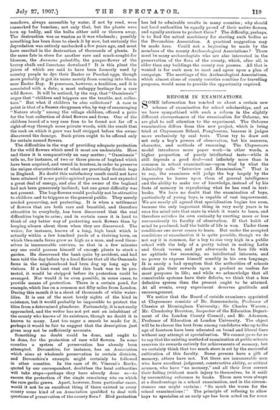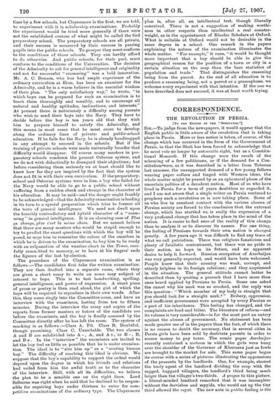REFORM IN EXAMINATION'S. -
SOME information has reached us about a certain new scheme of examination for school scholarships, and as we have sympathised with such a reform in the slightly different circumstances of the examination for Osborne, we are glad to call attention to the experiment. The Osborne examination differs from this new project, which is being tried at Clayesmore School, Pangbourne, because it judges more exclusively by oral tests. These try to draw out not only a boy's powers of observation, but his manners, character, and methods of reasoning. The Clayesmore model introduces more paper work—in other words, a higher proportion of purely intellectual tests—while it still depends a good deal—and infinitely more than is common in school examinations—upon trial by what the Admiralty calls " Interview and Examination." That is to say, the examiners will judge the boy largely by the impression he leaves upon them of general intelligence and the ability to make use of knowledge, instead of by his feats of memory in reproducing what he has read in text- books. We have no doubt that the examination of boys, particularly of young boys, is capable of vast improvement. We are nearly all agreed that specialisation begins too soon, because the only important thing in very early years is to coax the mind into that state in which it wants to learn, and therefore satisfies its own curiosity by exerting more or less unconsciously its faculty of observation. If that habit of mind be produced, half the battle of life is won. Under those conditions one never ceases to learn. But under the accepted conditions of examination it is quite possible, though we do not say it is common, for a boy to rise very high in a public school with the help of a pretty talent in making Latin and Greek verses, and yet afterwards to face life with no aptitude for reasoning, no intellectual interests, and no power to express himself sensibly in his own language. It is surely a bad symptom that the authorities of schools should pin their rewards upon a product so useless for most purposes in life ; and while we acknowledge that all conceivable systems have their defects, we think that a less defective system than the present ought to be attained. At all events, every experiment deserves gratitude and encouragement.
We notice that the Board of outside examiners appointed at Clayesmore consists of Dr. Sonnenschein, Professor of Classics at Birmingham University; Sir Charles Warren ; Mr. Cloudesley Brereton, Inspector of the Education Depart- ment of the London County Council; and Mr. Adamson, Professor of Education at London University. The object will be to choose the best from among candidates who up to the age of fourteen have been educated on broad and liberal lines without any attempt at specialisation. We cannot go so far as to say that the existing method of examination at public schools reserves its rewards entirely for achievements of memory, but we certainly think that too much store is set by the successful cultivation of this faculty. Some persons have a gift of memory, others have not. Yet there are innumerable men who have excellent judgment, constructive ability, or critical acumen, who have "no memory," and all their lives correct
their failing (without much injury to themselves, be it said) by unremitting reference to books. These men were always at a disadvantage in a school examination, and in the circum- stances one might exclaim "So much the worse for the school examinations !" The principle of refusing to allow boys to specialise at an early age has been acted on for some time by a few schools, but Clayesmore is the first, we are told, to experiment with it in scholarship examinations. Probably the experiment would be tried more generally if there were not the established custom of what might be called the tied preparatory school. The preparatory schools are all private, and their success is measured by their success in passing pupils into the public schools. To prosper they must conform to the conditions of those schools. They can hardly afford to do otherwise. And public schools, for their part, must conform to the conditions of the Universities. The decision of the Admiralty to ask for general intelligence and originality
and not for successful "cramming" was a bold innovation. Mr. A. C. Benson, who has had ample experience of the ordinary curriculum at Eton, has been an examiner for the Admiralty, and he is a warm believer in the essential wisdom of their plan. "The only satisfactory way," he wrote, "in which boys can be prepared for such an examination is to teach Ahem thoroughly and sensibly, and to encourage all natural and healthy aptitudes, inclinations, and interests." At present there is notoriously a difficulty among parents who wish to send their boys into the Navy. They have to decide before the boy is ten years old that they wish him to prepare himself to satisfy the Admiralty, and this means in most cases that he must cease to develop along the ordinary lines of private- and public-school education. If be fails for the Navy, he is already handicapped in any attempt to succeed in the schools. But if the training of private schools were made universally broader that difficulty would disappear. Of course ninny masters in pre- paratory schools condemn the present Osborne system, and we do not wish didactically to disregard their objections ; but before considering them seriously we at least should like to know how far they are inspired by the fact that the system does not fit in with their own curriculum. If the preparatory- school and Osborne systems were iu line, a boy who failed for the Navy would be able to go to a public school without suffering from a sudden check and change in the character of his education. It may be said—and the danger ought frankly to be acknowledged—that the Admiralty examination is leading in its turn to a special preparation which trios to foresee all the tests of general intelligence. We need not dwell upon the horribly contradictory and hybrid character of a " cram- ming." in general intelligence. It is an alarming case of Plus fa change, plus c'est /a me-me chose. But we cannot believe that there are many masters who would be stupid enough to try to predict the exact questions with which the boy will be posed, to urge him to remember the colour of the omnibus in which be is driven to the examination, to beg him to be ready with an ex1Panation of the weather-chart in the Times, care- fully committed to memory, or to have at his fingers' ends the figures of the last by-election.
The procedure of the Clayesmore examination is as follows :—The candidates first take the written examination. They are then drafted into a separate room, where they are given a short essay to write on some easy subject of interest to boys. This is to test handwriting, spelling, general intelligence, and power of expression. A short piece of prose or poetry is then read aloud, the gist of which the boys will be required to reproduce in their own words. After this, they come singly into the Committee-room, and have an interview with the examiners, lasting from ten to fifteen minutes. During the interview the essay and copies of the *reports from former masters or tutors of the candidate are before the examiners, and the boy is finally assessed by the ' Committee directly after he has left the room. The system of marking is as follows :—Class A, Fit. Class B, Doubtful, though promising. Class C, Unsuitable. The two classes
A and B are subdivided into A – , A, and B – , B, and B+. In the " interview " the examiners are invited to let the boy feel as little as possible that be is under examina- tion. The ideal is to "size him up" as a "soaring human boy." The diffieulty of reaching this' ideal is obvious. We suppose that the boy's capability to support the ordeal would depend upon the degree in which his friends and relations had veiled from him the awful truth asto the character
• of the interview. Still, with all its difficulties, we believe the plan to be a sensible one on the right lines. Lord Selborne was right when he said that be declined to be respon- sible for requiring boys under thirteen to enter for com- petitive examinations of the ordinary type. The Clayesmore plan is, after all, an intellectual test, though liberally conceived. There is not a suggestion of making worthi- ness in other respects than intellectual a real counter- 'weight, as in the appointment of Rhodes Scholars at Oxford. What is suitable at Oxford would not be desirable in the same degree in a school. One remark in the papers explaining the nature of the examination illuminates the whole matter. "For example," it runs, "it would be thought more important that a boy should be able to give the geographical reason for the position of a town or city in a certain situation on the map than the bare statistics of population and trade." That distinguishes the reasoning being from the parrot. As the end of all education is to produce a reasoning being, not a parrot or a gramaplione, we welcome every experiment with that intention. If the one we have described does not succeed, it was at least worth trying.







































 Previous page
Previous page